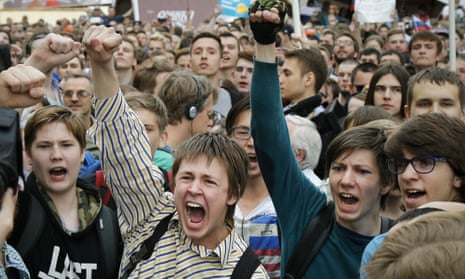It takes a lot to shock me in Russia, after 45 years of studying it. But this month my blood ran cold. Not because I watched innocent kids being hauled off the street by thuggish riot forces, and not because I was myself arrested and questioned by police for seven hours – though those incidents played a part – but because of what I witnessed in a Russian state television studio. But let’s start at the beginning …
On “Russia day”, 12 June, thousands of people protested in central Moscow against Vladimir Putin and his kleptocratic clique. There was no rhyme or reason to the arrests that followed. “National guards” in black tunics sliced through the crowd in groups of five, snatching random people and hustling them into police vans. You might have been holding a Russian flag (on Russia day!), you might have been chanting “Russia without Putin”, or you might just have been watching, or even – in one case – explaining to an interviewer why you supported Putin … nothing protected you.
A week later, I found myself in the provincial city of Nizhny Novgorod. I was travelling with a group of tourists on a study trip, meeting politicians, experts, activists. My job as in-house “expert” was to lead the discussions and help the participants get a feel for Putin’s Russia. It didn’t take long before explanations of the emerging police state became redundant.
We were chatting to a representative of Putin’s own party over breakfast in our hotel when a posse of plainclothes cops, accompanied by a cameraman, gatecrashed our meeting and escorted us from the premises. We were taken to a police station, where I was held for seven hours, being interrogated about what I was “really” doing.
My interrogator could not grasp the concept of a “study tour”. Tourists should walk round Red Square and go to the Bolshoi, not interview politicians or visit environmental disaster zones, or meet teenage supporters of Putin’s arch-enemy Alexei Navalny.
They seemed to know everything about me – even that I had been expelled from the Soviet Union in 1989. Why was I pretending to be a tourist when I was really a journalist? They refused to give me anything to eat or drink. After four hours I was able to contact the British embassy in Moscow who insisted they at least give me water, and also put me in touch with a lawyer. Eventually, they let me off with a small fine – but only after I was forced to sign a false statement “confessing” to having violated visa regulations.
Back in Moscow we were invited by Anatoly Kuzichev, the host of a political talk show, to sit in the studio during a live broadcast on state television’s Channel One. Nominally the topic under discussion was the anniversary of Hitler’s invasion of the USSR on 22 June 1941 – but this was just a pretext for a hate session against Ukraine, Poland, and anyone who dared to criticise Russia.
In Nineteen Eighty-Four, citizens gather for “Hate Week”, where images of the state’s chief enemy are shown and the audience scream their hatred at him. Here, pictures of a man being arrested in Ukraine for carrying a Soviet flag flickered on the screen, and a token Ukrainian “expert” was allowed to explain why communist symbols are banned there. But within seconds she was shouted down by the two alpha-male hosts, who sneered at her, denouncing the Ukrainian government as Nazis and Russophobes. Her only role, it seemed, was to act as a punch bag. After the show I asked her why she agreed to put herself up for such humiliation. She turned away and refused to speak.
One of the presenters, Artyom Sheinin, a veteran of the Soviet war in Afghanistan, strutted around like an exploding parcel of boorishness and manufactured anger. He cursed the Polish parliament for voting to remove memorials to the Soviet occupation of their country. “I won’t shy from the word,” he said, “these people are bitches, animals … ” His lip curled as he spat the words into the camera.
Sitting next to me was a young floor manager, scarcely in her 20s, whose job was to orchestrate the applause. Whenever the hosts made some particularly venomous comment, she cracked her palms together – giving the signal for the audience to burst into applause – and then after about four seconds gave a circular “wind down” signal, which the audience also followed. I had seen shows like this on Russian TV, and found them distasteful and crude – but seeing it in action left me speechless. I turned to the hate-leader during a commercial break and asked her if she had read George Orwell. She didn’t know who he was.
The Russian writer Nikolai Gogol once described Russia as a troika – a three-horse carriage – admired by all the world as it thundered by. Admiration was what Putin once sought. When I worked as a consultant to the Kremlin in the early part of his rule I remember advising his chief propagandist that if they wanted to woo the west they should start by demonstratively turning their back on communism and reaching out to the countries they once occupied. These days Russia woos like a gangster, not a lover. From what I saw, the Russian troika is now hauled by three old nags, xenophobia, fear and intimidation, hurtling back to a discredited past.
